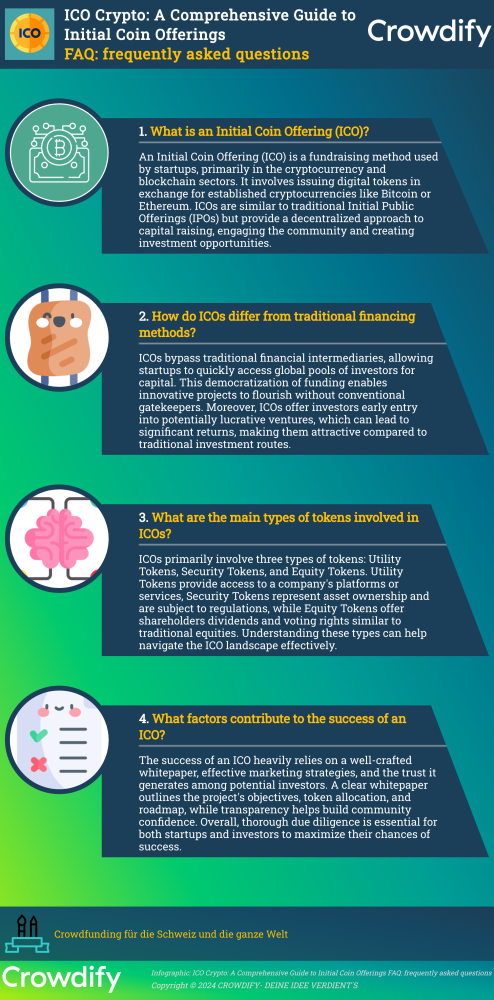
ICO Crypto: A Comprehensive Guide to Initial Coin Offerings
Introduction to ICO's and Their Importance
Initial Coin Offerings (ICOs) have revolutionized the way startups raise funds, bypassing traditional financial routes. By offering digital tokens in exchange for capital, ICOs provide a decentralized approach to crowdfunding. Their importance cannot be overstated: they democratize investment opportunities, grant startups quick access to capital, and foster innovation in the blockchain space. For investors, ICOs offer entry into groundbreaking projects at early stages. However, understanding their mechanics and potential risks is crucial for both entrepreneurs and investors. As the tech landscape evolves, ICOs' role in shaping future economies continues to grow.
What is an ICO? Definition and Explanation
An Initial Coin Offering (ICO) is a fundraising method used primarily by startups in the cryptocurrency and blockchain industries. Similar to an Initial Public Offering (IPO) in the traditional stock market, an ICO involves issuing digital tokens in exchange for capital. These tokens may represent a stake in the project or have utility within the project's ecosystem. ICOs allow startups to raise funds quickly, bypassing traditional financial intermediaries. By participating in an ICO, investors can potentially benefit from the project's future success, making this a high-risk but potentially high-reward investment opportunity.
ICO Crypto: Understanding the Basics
Initial Coin Offerings (ICOs) are pivotal in the world of cryptocurrency, providing a unique fundraising mechanism for startups and projects. At its core, an ICO involves selling a new cryptocurrency token to early backers in exchange for established cryptocurrencies like Bitcoin or Ethereum. This process not only raises capital but also engages the community and creates a vested interest in the project's success. Understanding ICOs requires knowledge of blockchain technology, smart contracts, and regulatory landscapes, making it essential for both investors and innovators to grasp the basics fully.
How Does an ICO (Initial Coin Offering) Work?
An Initial Coin Offering (ICO) operates much like an Initial Public Offering (IPO) but within the cryptocurrency ecosystem. Companies seeking to raise funds create a whitepaper outlining their project, goals, and needs. Investors buy the project's tokens using established cryptocurrencies like Bitcoin or Ethereum. These tokens can serve various purposes, such as granting access to the platform, profit-sharing, or voting rights. Once the ICO ends, tokens are traded on cryptocurrency exchanges. The ICO's success relies heavily on its whitepaper, marketing, and trust, making due diligence crucial for potential investors.
Benefits of ICO's for Startups and Investors
ICO’s, or Initial Coin Offerings, serve as a revolutionary fundraising mechanism that benefits both startups and investors. For startups, ICOs offer access to a global pool of investors without traditional financial gatekeepers, enabling faster and more versatile funding. This democratizes capital raising, allowing innovative projects to flourish. For investors, ICOs provide early access to potentially high-growth ventures, often at discounted rates, which can result in substantial returns. Furthermore, the transparency and decentralization inherent in blockchain technology offer additional layers of security and trust, making ICOs a compelling option for both startups eager to bring new ideas to market and investors seeking fresh opportunities.
Types of ICO's and Their Applications
Initial Coin Offerings (ICOs) come in various forms, each serving distinct purposes and applications. The primary types of ICOs include Utility Tokens, Security Tokens, and Equity Tokens. Utility Tokens grant access to a company's product or service, often fueling a decentralized application. Security Tokens are akin to traditional securities, representing asset ownership and subject to regulatory oversight. Equity Tokens provide shareholders with dividend distributions and voting rights, similar to equities in a firm. Understanding these types allows investors and startups to navigate the ICO landscape more effectively, leveraging the right token type to achieve specific goals and meet regulatory requirements.
ICO Initial Coin Offering: Key Features and Processes
An Initial Coin Offering (ICO) serves as a pivotal method for startups and projects to raise capital by issuing digital tokens. Key features of an ICO include token creation, which typically occurs on blockchain platforms like Ethereum. The process usually involves a whitepaper detailing the project's objectives, token allocation, and future roadmap. Investors participate by exchanging established cryptocurrencies, such as Bitcoin or Ethereum, for the new tokens. This democratized funding model allows early adopters to potentially reap significant returns, making ICOs a favored choice for innovative ventures. However, thorough due diligence and understanding the regulatory landscape are essential for both issuers and investors.
Case Studies: Successful ICO Crypto Projects
Examining successful ICO crypto projects provides invaluable insights for both investors and startups. A prime example is Ethereum, which raised over $18 million in 2014 and revolutionized the blockchain industry with its smart contract functionality. Similarly, Binance Coin, which raised $15 million in 2017, has grown into one of the world's leading cryptocurrencies, providing utility and driving demand on the Binance Exchange. Another standout is EOS, which raised a staggering $4 billion through a year-long ICO, showcasing the potential for long-term funding campaigns. These case studies highlight how strategic planning and unique value propositions can lead to groundbreaking success in the crypto world.
Crypto ICO vs. Traditional Funding Methods
Crypto ICOs and traditional funding methods offer distinct advantages and challenges. While traditional funding involves venture capital and bank loans, ICOs enable startups to raise capital by issuing tokens directly to investors, bypassing intermediaries. ICOs provide a global reach and faster funding process, often with fewer regulatory hurdles. However, they also carry higher risks, including market volatility and potential fraud. Traditional funding boasts established legal frameworks and investor protections but can be slower and more bureaucratic. Both methods have their place, and understanding their differences can help businesses choose the right approach for their specific needs.
Tips for Launching a Successful ICO
Launching a successful ICO requires strategic planning and meticulous execution. Begin by crafting a clear, compelling whitepaper that outlines your project's vision, technology, and roadmap. Engage with your community early and Create confidence with your project video">build trust through transparent communication. A dedicated, knowledgeable team is crucial, as is securing legal advice to navigate regulatory landscapes. Opt for a pre-ICO audit to ensure security and viability. Market your ICO through targeted campaigns and leverage social media to build awareness. Timing is also key; launch during favorable market conditions. Remember, investor confidence hinges on a professional presentation and the realistic potential of your project.
Risks and Challenges of ICO's
Investing in an Initial Coin Offering (ICO) can offer substantial returns, but it comes with considerable risks and challenges. Regulatory uncertainty is a primary concern, as governments worldwide are still figuring out how to manage and control these new forms of fundraising. Additionally, there's a risk of fraud, with some ICOs being outright scams. Technological risks also loom large, including cybersecurity threats that can lead to substantial financial losses. Moreover, the volatile nature of the crypto market adds another layer of uncertainty, making it crucial for investors and startups alike to conduct thorough research and due diligence. Understanding these risks can help in making informed decisions and mitigating potential losses.
FAQ: Frequently Asked Questions about ICO's and ICO Crypto
Navigating the world of Initial Coin Offerings (ICOs) can be daunting, especially for newcomers. This FAQ section aims to demystify ICOs and provide clear, concise answers to common queries. What exactly is an ICO? An ICO, or Initial Coin Offering, is a fundraising method where startups issue digital tokens. How do ICOs benefit startups and investors? Startups gain quicker access to capital while investors have the opportunity to support and profit from innovative projects. Are ICOs regulated? Regulations can vary widely by jurisdiction, making it essential for participants to stay informed. Discover all the critical information you need to confidently navigate the ICO landscape.
What are the Regulatory Considerations for ICO's?
Navigating the regulatory landscape is crucial for the success of an Initial Coin Offering (ICO). Regulatory considerations for ICOs involve compliance with securities laws, anti-money laundering (AML) regulations, and know-your-customer (KYC) requirements. Different jurisdictions have varying legal frameworks, so it's essential to understand the specific laws applicable in each region. Failure to comply can lead to severe penalties and legal repercussions. To mitigate risks, consult legal experts specializing in blockchain and fintech regulations. Proper documentation and transparent communication with investors can also help in maintaining regulatory compliance, ensuring both the project's legality and its credibility. Always stay updated with evolving regulations to safeguard your ICO's success.
How to Choose the Right ICO for Investment
Selecting the right Initial Coin Offering (ICO) for investment requires thorough research and careful consideration. Begin by assessing the project's whitepaper to understand its goals, technology, and roadmap. Evaluate the team’s credentials to ensure they have the expertise needed to execute the project. Examine the project's community and social media presence for transparency and active engagement. It's crucial to review the tokenomics to understand how tokens are allocated and used. Finally, check for regulatory compliance and security measures to safeguard your investment. Making an informed decision minimizes risks and maximizes potential returns in the volatile world of ICOs.
Best Practices for Conducting an ICO
Conducting an Initial Coin Offering (ICO) successfully requires meticulous planning and adherence to best practices. Start by developing a clear and compelling whitepaper articulating your project's vision, technology, and benefits. Build a robust legal framework to ensure compliance with regulatory requirements, safeguarding both the project and investors. Effective marketing is crucial; leverage social media, influencer partnerships, and community engagement to generate buzz. Transparency fosters trust, so maintain regular, honest communication with your audience. Utilize smart contracts to secure transactions and safeguard funds. Finally, perform thorough security audits to protect against cyber threats, ensuring a seamless and secure ICO experience for all participants.
Crowdfunding as an Alternative to ICO's
Crowdfunding and Initial Coin Offerings (ICOs) both serve as innovative fundraising methods, but they cater to different needs. While ICOs attract investors with the potential of high returns through token sales, crowdfunding focuses on collective financial contributions without the promise of instant financial gain. Crowdfunding platforms like Kickstarter enable startups to validate their ideas and build community support, often providing backers with early access or exclusive perks. This model is ideal for projects that need initial capital influx without navigating the complex regulatory landscape associated with ICOs. Understanding both options can help entrepreneurs select the best path for their specific goals.



